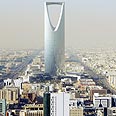
Riyadh, Saudi Arabia
צילום: רויטרס
Saudi central bank to head new Gulf monetary union
New council charged with drawing up framework of single currency with eye on developing Mideast equivalent of European Union. 'From Saudi Arabia's position, it shows a clear commitment to bring all the countries closer together and move toward the currency union,' says economist at Riyadh-based Banque Saudi Fransi-Credit Agricole Group
The head of Saudi Arabia's central bank on Tuesday was named the first chairman of a council that will serve as the precursor to a regional central bank in the latest step toward a unified Gulf currency and greater economic integration.
Saudi Arabian Monetary Agency head Mohammed al-Jasser's appointment came during the first meeting of the newly-created Gulf Monetary Council - a body that groups together the OPEC kingpin, as well as Kuwait, Bahrain and Qatar.
Two other Gulf Arab states, the United Arab Emirates and Oman, have opted out of the plan.
The meeting in the Saudi capital, Riyadh, appeared to underscore a directed push to move ahead with a broader unification and single currency process that has been thwarted for years by political bickering, economic challenges and infighting, analysts said.
"From Saudi Arabia's position, it shows a clear commitment to bring all the countries closer together and move toward the currency union," said John Sfakianakis, chief economist at the Riyadh-based Banque Saudi Fransi-Credit Agricole Group. "It offers the Monetary Council, and the rest of the states, the ability to tap into the technical resources of Saudi Arabia and that of the (regional) central bank."
"The rest of the countries are seeking the needed leadership, and Saudi Arabia is demonstrating a clear commitment," he said.
The new council is charged with drawing up the framework of the single currency, including an exchange rate system and setting up the regional central bank with an eye on developing a Mideast equivalent of the European Union.
But the process has hit repeated roadblocks, the most recent being when the UAE - the Arab world's second largest economy - pulled out of the plan after Saudi Arabia, home to the world's largest proven reserves of crude oil, was selected to house the proposed central bank. The UAE's withdrawal was widely viewed as a reaction to being snubbed as headquarters for the new council and central bank.
Oman had earlier said it would not participate because it did not feel it was ready to fully integrate its economy into a broader regional body.
Still to be determined about the single currency is whether it would be pegged to a basket of currencies, the US dollar or some other currency. All six Gulf Cooperation Council nations peg their currencies to the dollar except for Kuwait which relies on a basket.
The new council's deputy chairman will be Bahrain's central bank head, Rasheed al-Maraj. Both he and al-Jasser will hold the jobs for one year before the slots rotate to Kuwait and Qatar.
Officials had said they wanted to set up the unified currency by this year, but that deadline appeared unrealistic from the outset.
Analysts said the new target is around 2015, but even meeting that tentative timeframe and moving on with greater integration requires overcoming hurdles that are obstructing efforts to set up a Gulf customs union, and agreements on transfer of labor, services and capital.
"In order for them to move toward giving a timeline for the currency union, they need to make important progress in the technical aspects," said Sfakianakis.
He said the meeting in Riyadh, and the ongoing discussions, reflects "an important political statement and commitment from the four countries that they're moving on despite, the exit of Oman and the UAE."










